Finalists named in hotly contested Shaheen 3MT® science qualifying round
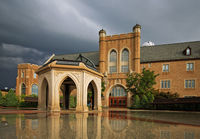
The College of Science Shaheen 3MT competition began with a big bang on Monday in Jordan Hall of Science. Julia Beck (Biochemistry), Elizabeth Loughran (Integrated Biomedical Sciences), and Stefan Freed (Biological Sciences) took the top three spots, and will go on to compete at the Shaheen 3MT® Final event on March 23.
Notre Dame biologist Cody Smith wins prestigious Sloan Research Fellowship
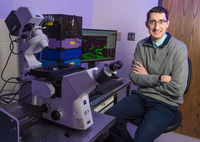
Cody J. Smith, the Elizabeth and Michael Gallagher Assistant Professor of Neural Development and Regeneration, has been selected as a 2017 recipient of the prestigious Sloan Research Fellowship.
How Wolves are Helping Nature Thrive
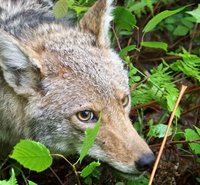
New Notre Dame research has shown that wolves living in Michigan’s Upper Peninsula are actually helping foxes, hares, and plants survive.
Senior John Huber awarded Gates Cambridge scholarship

This prestigious postgraduate scholarship program, which fully funds postgraduate study and research in any subject at the University of Cambridge, was established through a $210 million donation to the University of Cambridge from the Bill and Melinda Gates Foundation in 2000; this remains the largest single donation to a U.K. university.
Alex Perkins named Early Career Fellow by the Ecological Society of America
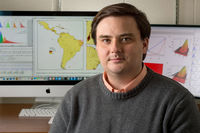
The University of Notre Dame’s Alex Perkins, Eck Family Assistant Professor, and member of the Department of Biological Sciences, the Department of Applied and Computational Mathematics and Statistics, the Eck Institute for Global Health, and the Environmental Change Initiative, was named a 2017 Early Career Fellow by the Ecological Society of America (ESA).
Zika: Where are we now?
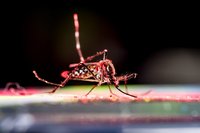
Professors in Notre Dame’s Department of Biological Sciences and members of the Eck Institute reflect on the outbreak, the challenges presented by the virus and the work yet to be done to help health professionals and key decision makers protect their citizens.
Notre Dame scientists study the past to predict climate change
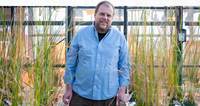
A chance meeting a decade ago in a graduate school hallway led paleoecologist Jason McLachlan to create a Jurassic Park-like wonder in Notre Dame’s greenhouse, where rows of salt marsh bulrushes have germinated from 100-year-old seeds.
Grad student will present new cancer findings at St. Jude Children’s Research Hospital
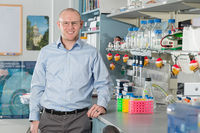
Biological sciences graduate student Joshua Mason has been selected to attend the 2017 National Graduate Student Symposium (NGSS) at St. Jude Children’s Research Hospital in Memphis, Tennessee. Selection in the NGSS is extraordinarily competitive as application is by invitation only. Over 1,500 students were invited to apply for the 2017 symposium of which only 42 students were selected to participate. Mason and the other selected participants will receive an all expenses paid trip to St. Jude this Spring where they will give a talk, present a poster, and meet with St. Jude scientists.
Research reveals a triple-drug regimen that could eliminate elephantiasis

A collaborative modeling study among three research groups, including Edwin Michael’s laboratory in the Department of Biological Sciences, reveals that a triple-drug regimen could accelerate the elimination of lymphatic filariasis, a mosquito-borne parasitic disease also known as elephantiasis. The study, which shows that the regimen requires far fewer applications than current two-drug combinations, is also significant because it provides a unified scientific consensus on the subject for policymakers who sometimes face a confusing array of separate claims.
Researchers publish hypothesis to explain speciation in Rhagoletis flies

Research led by fifth-year graduate student Cheyenne Tait in the Biological Sciences laboratory of Jeffrey L. Feder at Notre Dame has identified structures on the antennae of Rhagoletis flies that could explain why the flies are on their way to diverging into two distinct species even though they are not geographically separated.
Researchers Confirm Molecule's Role in Kidney Formation

The discovery could help advance understanding to address issues such as birth defects and repair of the kidney after illness or injury.
Improving Snow Measurement
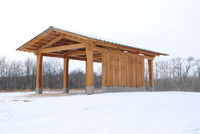
Although it may seem simple to calculate, snowfall cannot be well measured by simply placing a yardstick in the ground. In actuality, snow measurement is much more complicated and oftentimes the most accurate snow measurement devices are costly. However, two Notre Dame graduate students are working to improve the snow measurement process in an effective and affordable manner.
Biology major, Alexis Doyle, named Rhodes Scholar
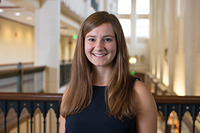
Doyle, of Los Altos, California, and Watkins, a native of Blacksburg, Virginia, are two of 32 Rhodes Scholars selected from a pool of 882 candidates who had been endorsed by their colleges and universities. They are Notre Dame’s 18th and 19th Rhodes Scholars and will commence their studies at Oxford University in October.
Channeling Our Inner Darwin: Adventures in the Galapagos Islands

During fall break, I traveled with thirteen other Notre Dame undergraduate students to the Galápagos Islands as part of a new science course, Practicum in Field Environmental Biology. Under the direction of Biological Science Professors, Gary Lamberti and Malcolm Fraser, we explored the islands and investigated individual research projects, which focused on observation of unique species in the islands. Throughout the week, our tour guide, Luis, offered insight into the amazing characteristics of the islands and explained how each island’s environment is conducive to the success of unique species. I have never been in a place quite like it, where you have to compete with sea lions for a space to sit on the boardwalk, or where iguanas will walk right in front of you and completely disregard your presence. The Galapagos Islands are the perfect example of nature existing with no fear of humans, and the protection of them and respect for the environment there was unquestionable.
In memoriam: Rev. James J. McGrath, C.S.C., professor emeritus of biological sciences

McGrath was an assistant chair of the Department of Biological Sciences, a dorm rector and later chaplain of the Notre Dame Fire Department.
Identifying DNA and Developing Data
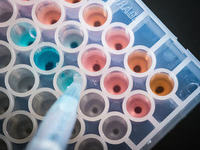
When it comes to battling disease and maintaining healthy environments, DNA sequencing can be imperative to success. At the University of Notre Dame, the Genomics and Bioinformatics Core Facility (GBCF) supports research in many areas that increasingly rely on DNA sequencing, including cancer biology, vector-borne diseases, the development of drug and antibiotic resistance, monitoring invasive species, and much more.
Notre Dame researchers to lead NSF Dimensions of Biodiversity study
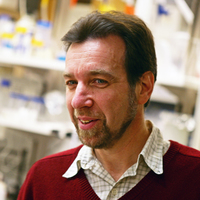
The study will focus on the apple maggot fly, Rhagoletis pomonella, and the parasitoid wasps that attack the fly.
Students share Galapagos Islands diversity with area children
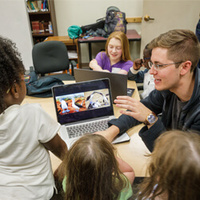
Days before their Fall Break trip to the Galapagos Islands as part of a course in the Department of Biological Sciences, 14 Notre Dame undergraduates introduced the Darwin-inspiring islands to youngsters at the Robinson Community Learning Center who will be “virtual explorers” with them through the adventure.
Shogren wins EPA graduate fellowship
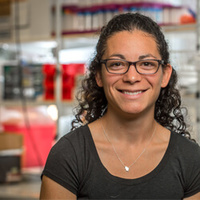
Biological sciences doctoral candidate, Arial Shogren, has been awarded the Science to Achieve Results (STAR) Graduate Fellowship from the U.S. Environmental Protection Agency (EPA). Shogren received the $132,000 grant for her project, “Modeling the Transport of Environmental DNA (eDNA)” in the EPA’s Emerging Environmental Approaches and Challenges Innovation program.
Biology NSF REU students present research findings
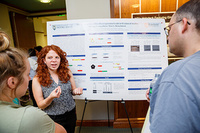
This summer, the University of Notre Dame welcomed 14 students to campus to participate in the NSF-funded Research Experience for Undergraduates (REU) program in the Department of Biological Sciences.